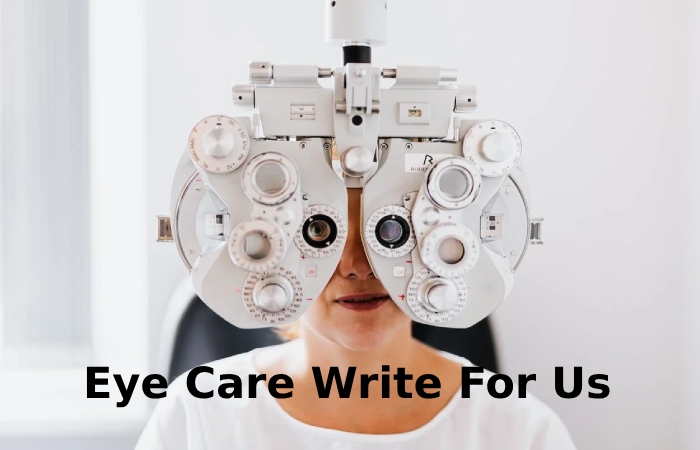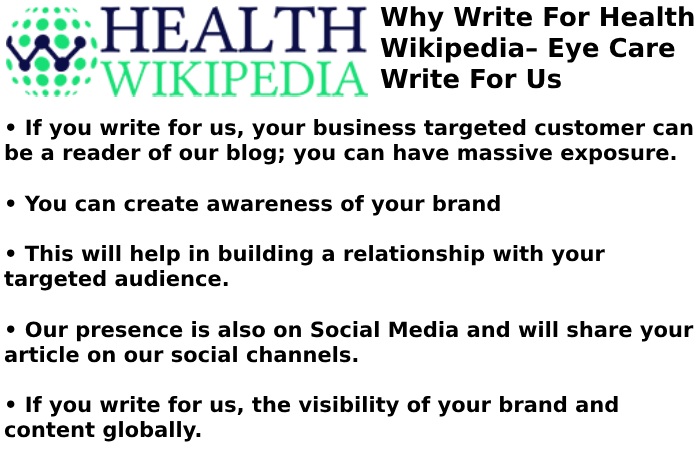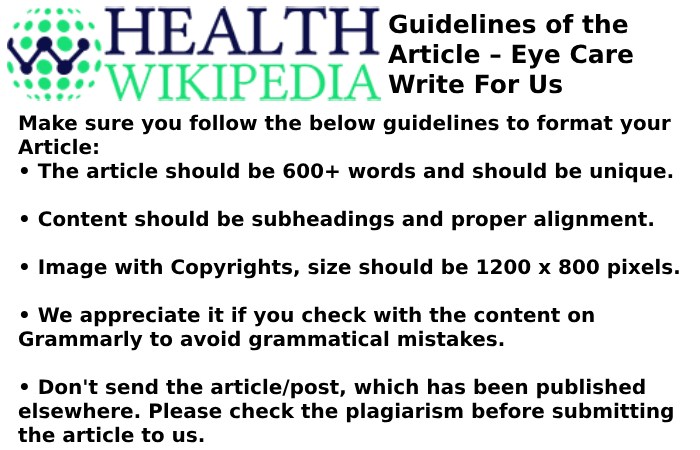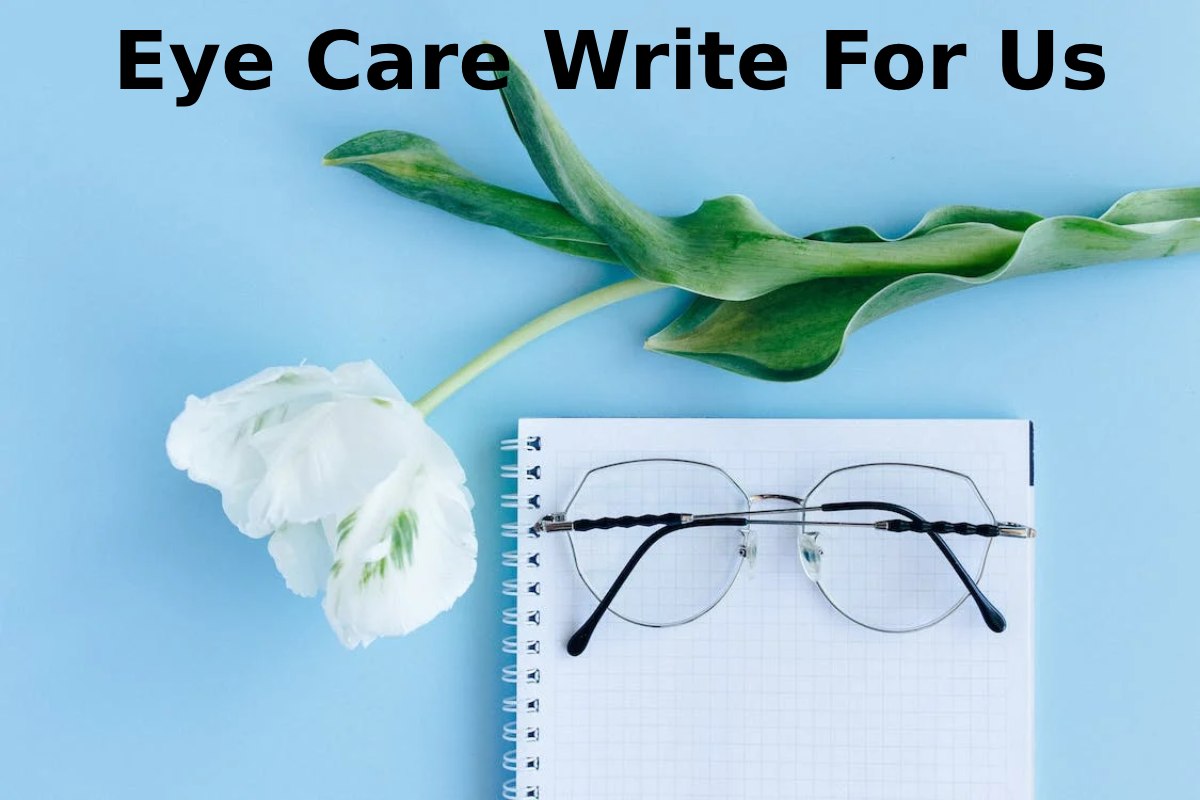Eye Care Write For Us – Good eye care is the best way to prevent diseases affecting visual health. This applies to everyday disorders such as conjunctivitis and more complex pathologies such as cataracts or glaucoma.
For this reason, it is essential to include healthy visual care habits in your daily routine and have a regular eye exam to detect visible disease symptoms in time.
Ten ways to take care of your eyesight
Most visual problems can be avoided, so we advise you to follow the recommendations to take care of your vision that we give you below.
Maintain a healthy diet.
Good eye health starts with food! Nutrients such as fatty acids, omega-3 three, lutein, zinc, and vitamins C and E help avoid age-related vision problems, such as degeneration and senile cataracts.
So, how to take care of the sense of sight through food? Well, you should include the following in your daily diet:
- Green leafy vegetables like spinach, lettuce, and kale.
- Salmon, tuna, and other oily fishes.
- Eggs, nuts, beans, and additional non-meat proteins.
- Oranges, grapefruit, and other citrus fruits.
- Lastly, pork and oysters.
Take care of the hygiene of your eyes.
Hygiene is significant to keep your eyes healthy, so when washing your face, you should clean the area around them.
Of course, if you wear contact lenses, wash them with soap and water before putting them in or taking them out. The same is true if you feel something has gotten into your eye or live in highly polluted areas.
Know your family history of visual health.
It is essential to talk with your family members to learn about their eye health history and to find out if any have been diagnosed with inherited diseases or conditions. In this way, you will better assess your risk factors and be able to take preventive measures.
Use adequate lighting and distance.
Direct light into the eyes and reflections and shadows for long periods can affect long-term vision. For this reason, specialists recommend working in spaces with big windows that allow natural light to enter and with a more significant light source focusing on the work object.
Likewise, a distance between 50 and 70 cm from the object that will remain in front of our eyes for an extended time is suggested.
Wear protective glasses
Wear safety glasses or goggles if you handle hazardous substances at work or home. Mainly if you use harsh chemicals, including ammonium hydroxide, potassium hydroxide, bleach, magnesium, and lime, all found in everyday items like fertilizers, ammonia, drain and oven cleaners, and cement.
Other compounds that require greater caution include sulfuric, hydrochloric, nitric, acetic, chromic, and hydrofluoric acids, present in everyday objects such as glass, vinegar, nail polish remover, car batteries, cleaning products, etc.
How can we take care of our eyes when practicing contact activities? Well, wear helmets with protective face masks or sports goggles.
Reduce the use of screens.
Watching at a computer or phone screen for an extensive period can cause:
- The sensation of tiredness in the eyes.
- Blurry vision.
- Difficulty focusing at a distance.
- Dry eyes.
- Headaches.
- Neck, back, and shoulder pain.
If you don’t know how to take care of your eyesight from screens, see our article on protecting your eyes from eye fatigue.
Sleep well
Little sleep means the eyes do not recover from the daily wear and tear. During the night, cells are regenerated that line the front face of the watch, so try to sleep 8 hours a day.

Visit the ophthalmologist regularly.
Everyone needs eye exams, even children. Therefore, it is recommended to attend an ophthalmology consultation once a year.
In the consultation and with the appropriate medical evaluations, diseases are ruled out, the treatment of the conditions is initiated,d. The appropriate formulas are prescribed for cases requiring lenses, such as myopia, farsightedness, or astigmatism.
If the specialist observes any anomaly in the tests included in the general ophthalmology consultation, they could request some special ophthalmological examinations to support the diagnosis.
Tips to improve eyesight
1. Go to the ophthalmologist
Go to the ophthalmologist at least once a year for routine check-ups that can detect any anomaly or problem and thus find a solution. Of course, in the event of any discomfort or pain, see your ophthalmologist as soon as possible.
2. Rest your eyes
It is essential to reduce visual fatigue, look up from the screen in front of you every 15-20 minutes, and look at a distant fixed point for a few seconds.
The importance of peripheral vision
For example, when we watch television, it is essential to be in a well-ventilated, humidified room that is not entirely dark. A small lamp will help us not lose perspective of our peripheral vision and the movements around us. It is also
3. Beware of the sun!
Just like we defend our skin from the sun with cream, using glasses with lenses, the proven UVA filter and the appropriate EU label are necessary for good visual health. The sun’s rays hitting our eyes directly can have negative long-term consequences. Therefore, wear sunglasses, also in winter!
4. Proper distance
The best thing to do is to keep a distance between 50 and 70 cm from the object we will have in front of us for an extended time. The computer screen should be placed at the same height as your eyes to not force your gaze up or down.
5. Food for our eyes
Vegetables and fruits loaded with vitamins A and C: carrots, blueberries, red fruits… and foods with magnesium, such as nuts, some cereals, etc., also help maintain good vision.
6. Surround yourself with clean air
Open spaces where air flows improve your visual health.
7. Tilt and body position
If we spend many hours sitting in your workplace, it is best to sit with your feet flat on the floor with your back and head straight. Thus, we will avoid light reflections.
8. Eye hydration
Sometimes our eyes become red and itchy, either after a long day in front of the computer, because water has entered the shower, etc. Always having an eye drop of artificial tears prescribed by an ophthalmologist will soothe and rehydrate our eyes.
Remember that it is essential to visit the ophthalmologist regularly to avoid more severe problems such as early detection of glaucoma, diabetic retinopathy, and age-related macular degeneration. All these diseases can be treated in time to stop or slow their progression as much as possible.
When is it necessary to wash your eyes?
Eyewash should be performed daily. It is true that when we clean our faces, we also include our eyes in that hygiene process. In addition, tears are responsible for removing waste and foreign bodies. However, on certain occasions, for example, when we suffer from conjunctivitis (inflammation of the eye), blepharitis (inflammation of the eyelid), or after eye surgery (e.g.,g refractive surgery… create a hyperlink), we must carry out a more exhaustive cleaning. For this, the use of specific products is recommended.
How to clean the eyes?
Eye washing must be carried out carefully since the eye contour comprises thin, sensitive skin. For daily hygiene, you can moisten a cotton ball with warm water and wipe it over the tear duct and eyelids. It would be best if you used a cotton pad for each eye. In this way, you will avoid cross-infections.
The best products for eye hygiene
Saline
The physiological serum is a saline solution made up of water and salt. Specifically, it is composed of 0.9% sodium chloride in water. Its salt concentration is equal to that of human blood. Hence, it is compatible with any organism. The physiological serum is ideal for eye washing and will not irritate. Its use is especially recommended to treat conjunctivitis. In this case, before applying the eye drops or eye drops prescribed by the ophthalmologist, you must clean the eye area with physiological saline using sterile gauze. Do not use physiological saline as a substitute for eye drops or artificial tears. These last two drugs are specific compounds for conditions like severe dry eye syndrome. The type of serum for eye washing is physiological saline in single-dose ampoules. They usually contain 5ml and are intended for single use.
Sterile eye wipes
Sterile eye care wipes contain a cleansing lotion that typically has moisturizing, antiseptic, and healing properties. The tissue facilitates the rapid adhesion of debris or foreign bodies. You should avoid getting the cleansing lotion from the wipe on the inside of your eyes, as it may irritate them. Eyelid cleaning should always be done toward the base of the nose. Treating inflammatory pathologies and infections and caring after minor surgery is recommended. It is a product that is very practical. The wipes are packaged, thus avoiding any contamination.
makeup removers
Putting on makeup always requires a second action: removing makeup. It is essential to do it with quality products that comply with health regulations. Choose hypoallergenic compounds without perfume or alcohol that respect the tear PH. Good hygiene of the eyelids depends not only on the products used but also on how makeup is removed. The skin of the lids is thin and delicate (between 0.33 and 0.36 mm thick). Hence, removing makeup from the eye with soft movements is recommended. Rubbing vigorously does not guarantee product removal more efficiently and could irritate. It is essential not to leave product residues, as this prevents the development from entering the cornea and causing infections. After removing makeup, it is recommended to apply an eye contour.
Likewise, You can submit your articles at contact@healthwikipedia.com
How to Submit Your Eye Care Articles (Eye Care Write For Us)?
That is to say, To submit your article at www.healthwikipedia.com, mail us at contact@healthwikipedia.com
Why Write for Health Wikipedia – Eye Care Write For Us

Eye Care Write For Us
That is to say, here at Health Wikipedia, we publish well-researched, informative, and unique articles. In addition, we also cover reports related to the following:
Doctorate
Eye movement
Sightline (architecture)
Amblyopia
Strabismus
Binocular vision
International Orthoptic Association
Visual impairment
Ocular prosthesis
Optician
Glasses
Contact lens
Corrective lens
Jurisdiction
Ophthalmology
Optometry
Guidelines of the Article – Eye Care Write For Us

Search Terms Related to Eye Care Write For Us
eyecare website
eyes on eyecare
optometry articles
optometrist medical writer
new grad optometry
bates palming eye improvement exercise
eyes on eye care jobs
eyes on glaucoma 2023
covalentcreative
eyes on myopia 2023
covalent careers optometry
eye care
eyes on dry eye
eyecare products
eye care magazine
Eye Health Write For Us
Vision care Write For Us
Optometry Write For Us
Contact lenses Write For Us
Eyeglasses Write For Us
LASIK surgery Write For Us
Cataract Write For Us
Glaucoma Write For Us
Retina Write For Us
Macular Degeneration Write For Us
Dry eye syndrome Write For Us
Eye Allergies Write For Us
Eye infections Write For Us
Corneal disorders Write For Us
Pediatric Ophthalmology Write For Us
Low vision Write For Us
Eye safety Write For Us
Digital eye strain Write For Us
Eye Nutrition Write For Us
Eye exercises Write For Us
Ophthalmology Write For Us
Eye makeup safety Write For Us
Eye Trauma Write For Us
Floaters and flashes Write For Us
Color Blindness Write For Us
Amblyopia (lazy eye) Write For Us
Diabetic eye care Write For Us
UV protection for eyes Write For Us
Eye donation Write For Us


